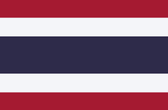
Call 0330 880 3600 Calls may be monitored or recorded. Opening Times.
- TRAVEL INSURANCE
- COVID-19 COVER
- More Options
- Help & Advice
- Existing Customers

Call 0330 880 3600 Calls may be monitored or recorded. Opening Times.

Need help?
UK Customer Services0330 880 3600*
Open Monday to Friday 9:00am to 6pm, Saturday 8:30am to 4pm and closed Sundays.
*Calls are recorded for training and quality purposes.

Official name: Kingdom of Thailand
Capital city: Bangkok
Languages spoken: Thai, English
Population: Around 70 million
Currency: Thai baht (THB)
Time zone: GMT+7
Driving side: Left
Climate: Tropical, with hot, humid weather and distinct rainy (May–Oct) and dry (Nov–Apr) seasons
Thailand is one of Asia’s most visited destinations, famous for its golden temples, tropical beaches, bustling cities, and delicious cuisine. Bangkok dazzles with a mix of skyscrapers and street markets, while Chiang Mai offers mountain scenery and temples. The islands of Phuket, Koh Samui, and Koh Phi Phi provide some of the world’s best-known beach escapes, while the north draws trekkers and cultural enthusiasts.
Travellers should note that Thailand enforces strict laws around the monarchy - criticism can result in imprisonment. Political demonstrations sometimes occur in Bangkok and other major cities, which can cause disruption and occasionally turn violent. Petty crime such as bag-snatching and scams targeting tourists are common. Same-sex relationships are legal, and LGBTQIA+ travellers generally find Thailand welcoming, though rural areas remain more conservative.
Thailand shares borders with Myanmar, Laos, Cambodia, and Malaysia. It has long coastlines on both the Gulf of Thailand and the Andaman Sea. The central plains are fertile rice-growing regions, while the north is mountainous and the south boasts tropical islands. The Chao Phraya River flows through Bangkok, serving as a key transport artery.
Suvarnabhumi Airport (BKK) in Bangkok is the main international gateway, alongside Don Mueang (DMK) for budget airlines. Chiang Mai, Phuket, and Krabi also have international airports. Thailand has a good domestic flight network, overnight trains, buses, and ferries linking islands and coasts. Highlights include the Grand Palace in Bangkok, Ayutthaya’s ancient ruins, the beaches of Krabi, and diving around Koh Tao and the Similan Islands. Adventure activities include trekking in the north, rock climbing in Railay, and exploring national parks such as Khao Sok.
UK nationals can enter Thailand without a visa for stays of up to 30 days if arriving by air, or 15 days if arriving by land. Longer stays require a visa, which can be applied for in advance. Passports must be valid for at least six months. The British Embassy is located in Bangkok, with consulates in Chiang Mai, Koh Samui, and Phuket.
The local currency is the Thai baht (THB). ATMs are widespread, though many charge fees for foreign cards. Credit and debit cards are widely accepted in hotels and shops, but cash is still needed for markets, taxis, and rural areas. Bargaining is common in markets, but fixed prices apply in malls and supermarkets.
Healthcare standards in Bangkok and major cities are excellent, with private hospitals offering world-class care, though at high cost. Rural areas have limited facilities. Comprehensive travel insurance is essential, covering medical evacuation if needed. Mosquito-borne diseases such as dengue fever and malaria (in some border regions) are present, so precautions are advised. Tap water is not safe to drink — bottled or filtered water should always be used. Travellers should also take care with food hygiene, particularly from street vendors.